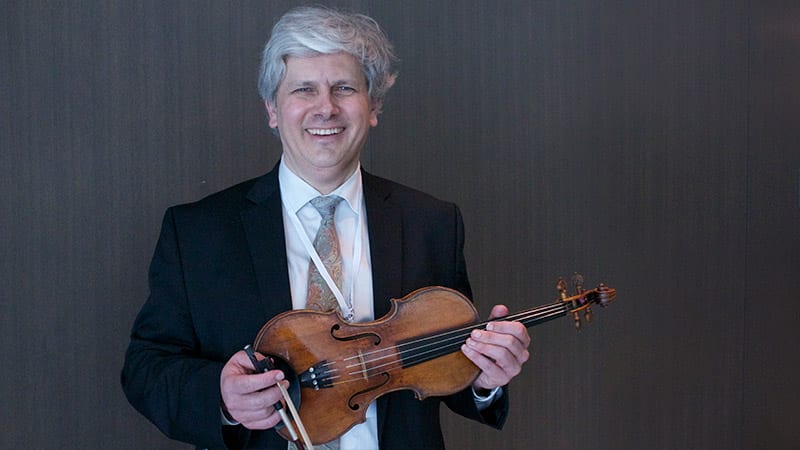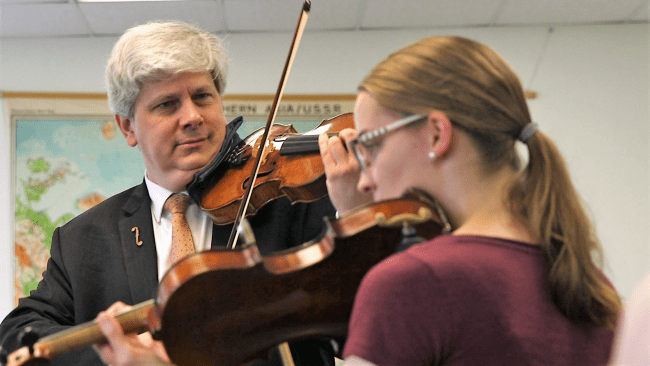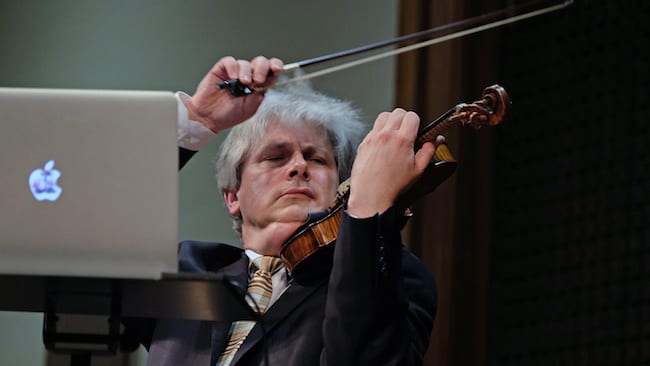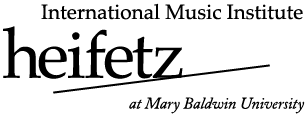Nicholas Kitchen
Artistic DirectorNicholas Kitchen‘s musicianship has been hailed by the New York Times as “thrilling, vibrant and captivating.” He is one of the most active and innovative performers in the music world today, as a solo violinist, chamber musician, teacher, video artist, technology innovator and arts administrator.

Early Background
Born in Durham, North Carolina, Nicholas Kitchen grew up in a family of musicians. His mother, a violinist, was Associate Concertmistress of the Greensboro Symphony and founder of the Duke University String School. His father was organist and choir-master at St. Stephen’s Episcopal church where he helped found a chamber orchestra and oversaw the installation of a magnificent Flentrop Organ. His father also concertized as a pianist while always being on the mathematics faculty of Duke University. Nicholas studied with Giorgio Ciompi at Duke and began performing publicly as a very young child, performing multiple times as soloist with the North Carolina Symphony, and becoming deeply involved in all aspects of the activities of his parents: performing, teaching, organ tuning and registration selection, as well as orchestra and choir preparation related to the orchestra of the Duke String School and the choir of St. Stephen’s Episcopal Church.
At sixteen, Nicholas began studying at the Curtis Institute in Philadelphia. Here he worked with Heifetz Institute faculty member David Cerone and coached with such musicians as Felix Galimir and Mieczslaw Horsowski, but very importantly he spent five years working intensively with the great violinist and conductor Szymon Goldberg, as well as being included in the conducting courses of Otto Werner Mueller.
Career Background
Kitchen has recently been entrusted with an important role of continuing the tradition of Szymon Goldberg. Mr. Goldberg’s wife, pianist Miyoko Yamane Goldberg arranged that her husband’s Guarneri del Gesù, known as the “Baron Vita,” joined its famous twin, the “Kreisler” Guarneri, in the collection of the Library of Congress. Both instruments were made by Guarneri at the same time, from the same wood. The Baron Vita was given on the condition that Mr. Kitchen play and travel with the instrument during his career and that he and the Library of Congress carry the extraordinary artistic approach evident in Mr. Goldberg’s playing and teaching into the future. This is most directly in evidence in the Szymon Goldberg Seminar and Festival in Toyama, Japan, where Mr. Kitchen serves as leading faculty.
At the end of his studies at Curtis in 1989, Kitchen joined his schoolmates and founded the Borromeo String Quartett (Heifetz Institute Ensemble In Residence) that went on to study at the New England Conservatory of Music in Boston. Very quickly the quartet won prizes at the Evian International Quartet Competition and the Young Concert Artists Auditions in New York. Ever since these first successes, the quartet has been in great demand, regularly performing a hundred concerts each year. The Quartet also received the Cleveland Quartet Award from Chamber Music America, the Martin S. Segal Award from Lincoln Center, and the Avery Fisher Career Grant.
Nicholas has been extremely energetic in combining teaching activities with his concerts. His interest in reaching out with music resulted in his doing multiple tours under the auspices of the US Information Service visiting most of the countries in Latin America for performances and teaching residencies. Nicholas has taught at the New England Conservatory of Music since 1992, when at the conclusion of their studies the Borromeo Quartet was asked to become Quartet-in-Residence.




Photo by Norm Shafer
Mr. Kitchen has worked closely with broadcast stations such as WGBH in Boston and National Public Radio in Washington, and has recorded for numerous record companies: Image Recordings, Denon, Bridge, Arabesque, Albany, Centaur, and others. In 2003 he began the Living Archive series, a recording venture devoted to capturing and communicating the essence of live music. Hundreds of CDs and DVDs have been made available for purchase on-demand to audience members allowing them to continue their experience with the music they have just heard in the live concert. Activities of Living Archive can be seen at www.livingarchive.org.
Embracing the possibilities of computer animation, Kitchen has developed his skills in drawing and graphic work to create animated material to be projected during live performance, including Childsplay, a video about Beethoven’s Op. 135 Quartet; and Ludwig’s Wig, a program about Beethoven which culminates in an abstract animation along with the second half of his Grosse Fugue.
Mr. Kitchen has performed for many years on the A. J. Fletcher Stradivarius, a violin purchased for long term loan to him by the A. J. Fletcher Foundation in Raleigh, North Carolina. In the present situation where he is able to play the Goldberg Del Gesu, the Foundation has graciously allowed the violin to be used by the second violinist of the Borromeo Quartet.

